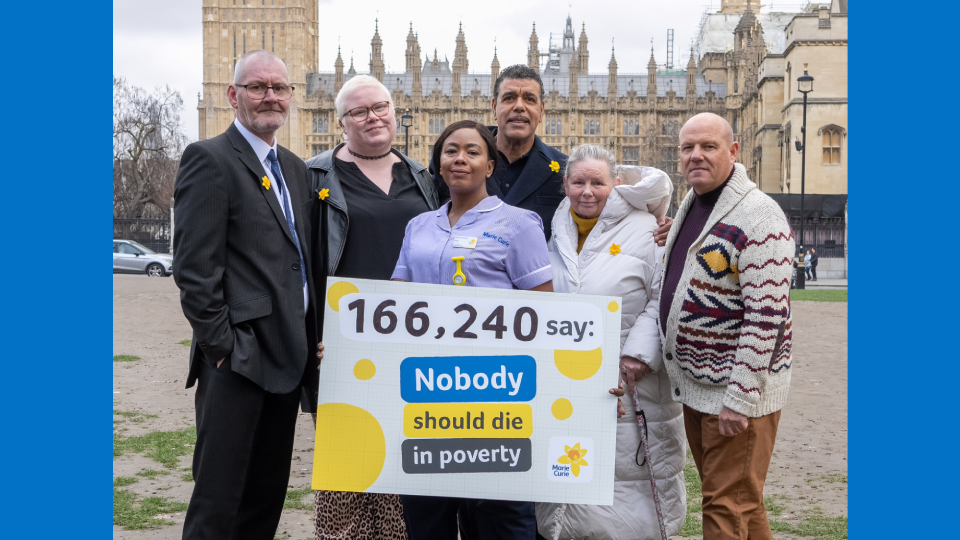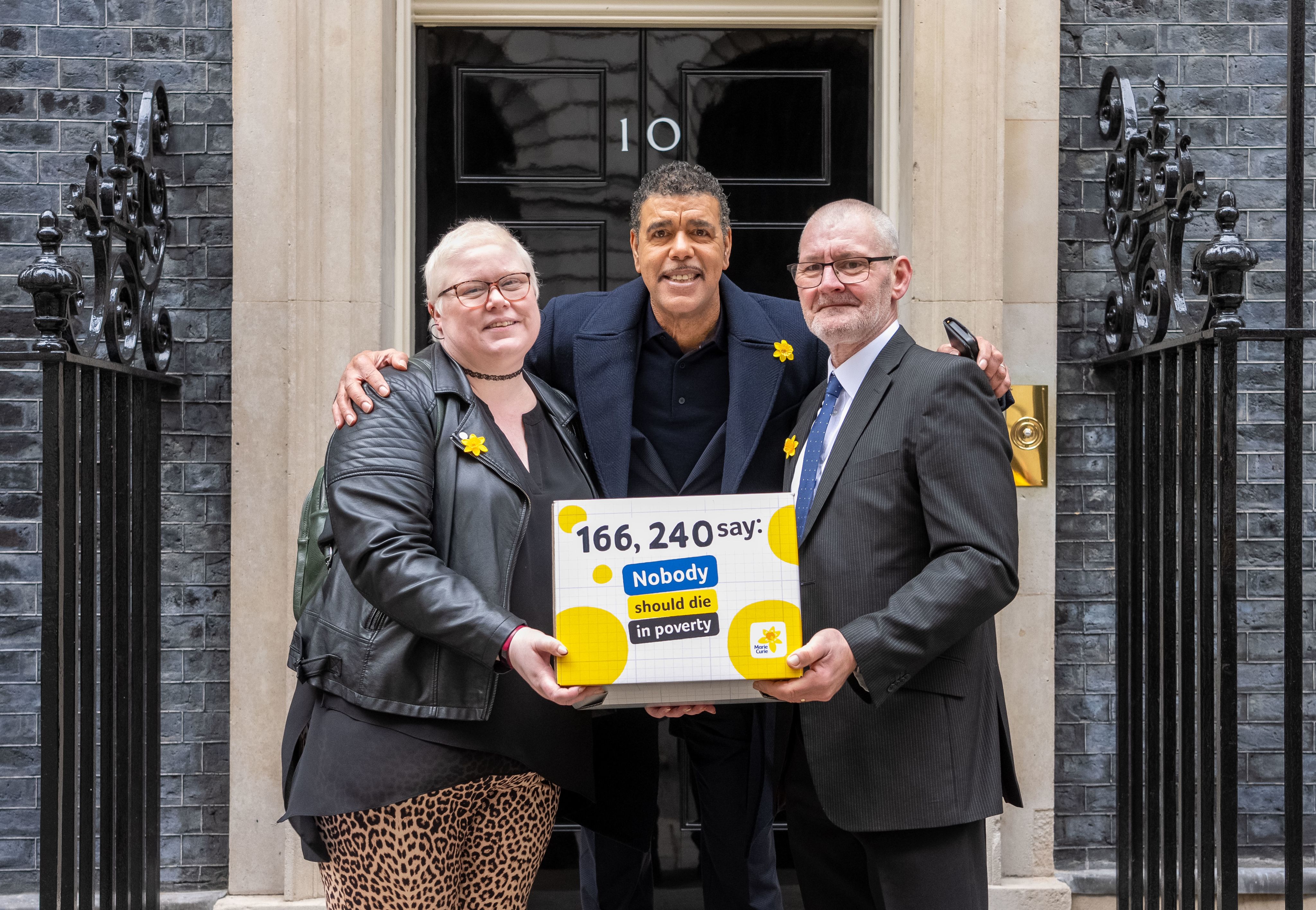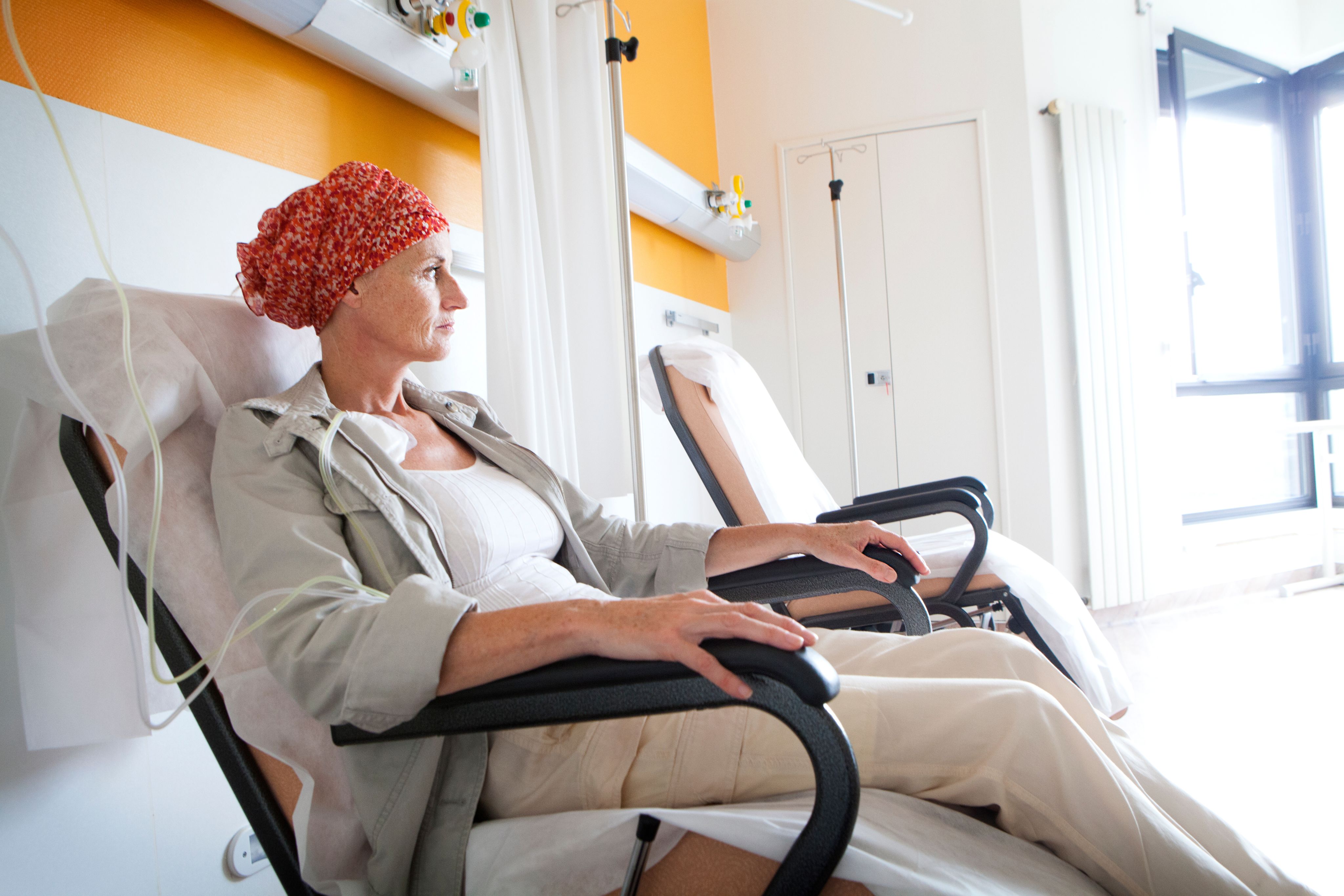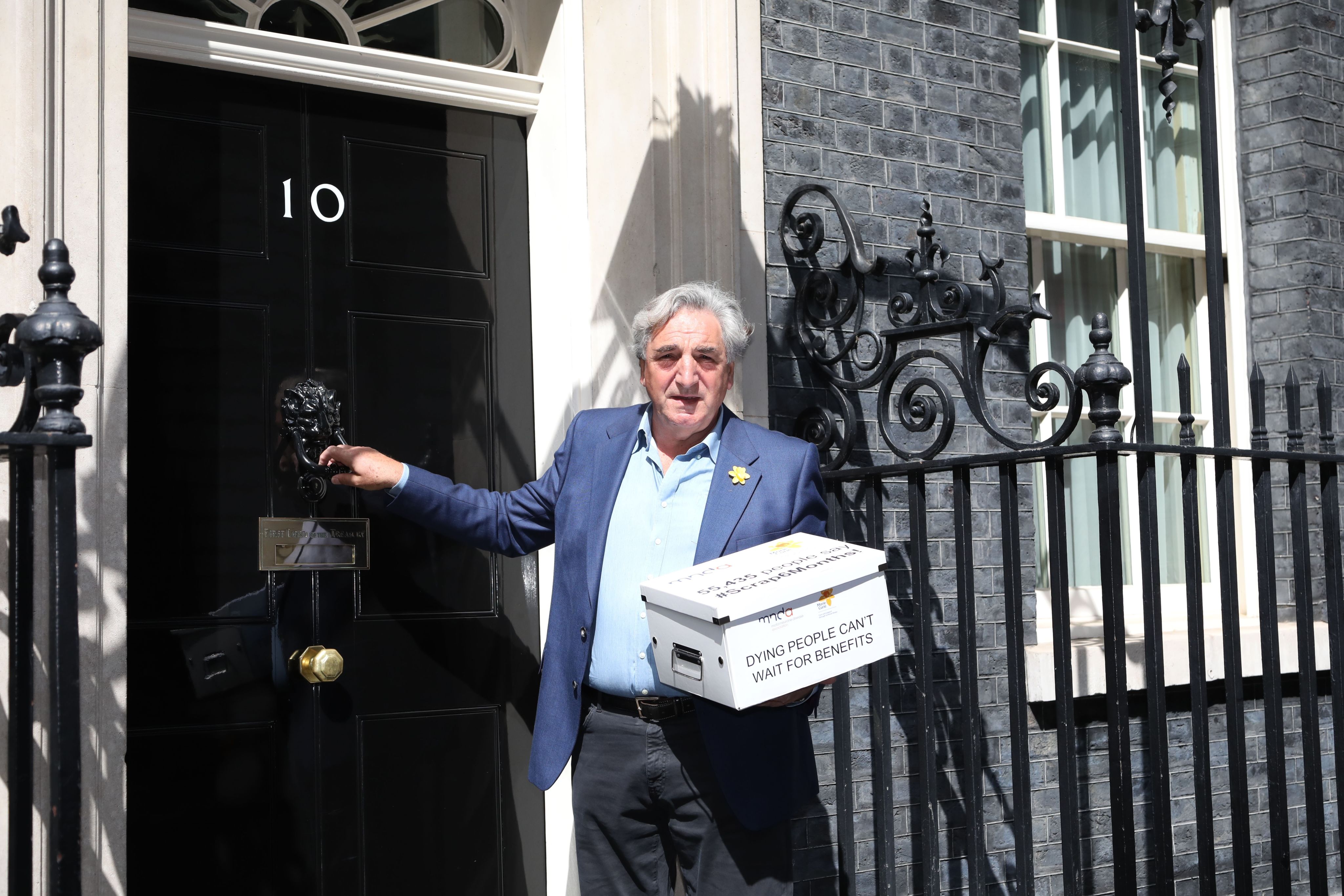Tackling the despair of dying in poverty
In partnership with Marie Curie, our researchers are supporting efforts to alleviate the risk of financial hardship at the end of life
Image credit: Jeff Moore / Marie Curie

Research undertaken by colleagues based in the University’s Centre for Research in Social Policy (CRSP) has revealed that more than 90,000 people in the UK die in poverty every year.
That’s 10 people an hour.
Many of those who experience financial hardship, do so as a direct result of their illness. This is particularly true of people under 65 years of age who often reduce their hours or stop working altogether following their diagnosis.
In fact, they are more than twice as likely to face these difficulties than those who die after pension age. A quarter of them die in poverty.
End-of-life charity Marie Curie have estimated that the additional cost of living with a terminal illness can rise to as much as £16,000 a year. And, with little recourse to state financial support, it’s easy to see why so many people of working age are pushed into poverty.
The pandemic has heightened pre-existing inequalities and has brought into sharp focus the relationship between income, poverty and health. Without state intervention, the situation is likely to worsen, especially as we endure the ongoing cost-of-living crisis.
These findings – made by CRSP’s Dr Juliet Stone – are helping UK charity Marie Curie to campaign for change.
Nobody should die in poverty
“It shouldn’t be harder to make ends meet at the end of your life. But many people are pushed into poverty when they’re diagnosed with a terminal illness.”
Image credit: Jeff Moore / Marie Curie

In 2022, Marie Curie launched its Nobody should die in poverty campaign, lobbying the UK Government to give terminally ill people early access to their State Pension as well as support with domestic energy and childcare costs.
The campaign has substantial public backing. A poll conducted by the charity shows that 75% of UK adults support giving dying people early access to their State Pension, with 72% of people agreeing that the Government has a responsibility to protect terminally ill people from falling into poverty.
More than 166,000 people signed the campaign petition which was delivered to Downing Street by Marie Curie ambassador Chris Kamara MBE on 23 February 2023.
Thousands more have shown their support by writing to their MPs, demanding change.
Supporting the campaign with hard truths

In 2021, aware that there was a problem but not its full extent, Marie Curie commissioned CRSP to calculate the actual number of people who die in poverty, and how the risk of end-of-life hardship varies for different groups of the UK population.
As well as the important headline data, the research reveals that some people within the working age population are more vulnerable than others.
Women and people from minority ethnic groups are disproportionately more likely to die in poverty, and families with children are particularly at risk. There are also variations across the country with pockets of vulnerability across the North East as well as in parts of London, Manchester, Birmingham and Leicester. In addition, the risk of poverty varies depending on the diagnosed condition.
The research findings – published as Poverty at the end of life in the UK – provide the underpinning data for the charity’s Nobody should die in poverty campaign.
Having used CRSP’s research to establish the extent of the issue – that is, who is most affected and how – Marie Curie is lobbying the Government for three things:
- early access to the State Pension for people of working age
- financial support with domestic energy bills
- help with childcare costs
Early access to the State Pension
“We contribute to our State Pension throughout our lives, expecting it to be there to support us when we can no longer work. But those diagnosed with a terminal illness before reaching retirement age are denied this security.”

Among working age people at the end of life, one in four will die in poverty.
Despite having paid into the State Pension pot for an average of 24 years, they are denied access to their contributions and, because of their illness, many have to stop working. They may be able to access some state benefits, but this support rarely covers the costs and income loss that accompany a terminal illness.
Calculating the additional costs associated with terminal illness is far from straightforward. People’s needs differ – their diagnoses and circumstances are extremely varied, and the timescales associated with life‑limiting conditions are unpredictable.
What’s more, some illnesses require people to make home adaptations, run medical equipment or pay for care – all of which can be hugely expensive.
Allowing early access to the State Pension would offset some of this additional expense, helping to save thousands of people from falling into poverty.
Dr Stone has calculated the cost of giving terminally ill people of working age early access to their pension and, in her autumn 2022 report for Marie Curie, concludes that it “could be a highly effective policy to reduce the risk of poverty among these individuals and their households”.
The spiralling cost of energy
“Expenses soar after a terminal diagnosis, and one of the biggest costs is energy.”

People living with terminal illness often experience worsening symptoms if they are unable to stay warm, and many need to heat their homes throughout the day. In addition, some require medical equipment at home – such as respirators, dialysis machines or monitors – which they have to run 24/7.
As a result, some people’s energy bills can rise as much as 75% following their diagnosis.
So, even before the current cost-of-living crisis, terminally ill people faced higher energy costs than the average household. This makes them particularly vulnerable to the ongoing energy price increases.
Marie Curie is calling for the Winter Fuel Payment to be extended to terminally ill people of working age, and for everyone who is terminally ill to be eligible for the Cold Weather Payment and Warm Home Discount.
And, as Dr Stone’s research highlights, “even the relatively modest measure of providing people with the Winter Fuel Payment and Warm Home Discount at the end of life would help lift some people out of poverty”.
Indeed, Dr Stone’s research shows that this change would lift nearly 1,000 out of poverty at the end of life – with a cost to the state of just up to £350 per household per year.
Juggling the costs of childcare
“There is no special provision for parents who are dying, and so many are being pushed into poverty.”

Two thirds of terminally ill working age parents experience poverty in the last five years of their life.
Hospital visits for treatment combined with the symptoms of their illness can be exhausting, and ensuring their children are well looked after during this time can be a logistical nightmare – not to mention horribly expensive.
However, state childcare benefits are not available to everyone. And, under the current system, if parents have given up work because of their illness, what they can claim may be further limited.
Therefore, to offer some relief and allow families to enjoy their remaining time together, Marie Curie is lobbying the UK Government to make existing childcare support available to all terminally ill parents.
The charity argues: “Everyone should be able to focus on what really matters to them in the time they have left, and not have to worry about their finances or struggle to make ends meet.”
A hopeful step
Image credit: Marie Curie

In May 2022, the UK Government took a small step towards addressing the issue by announcing the Social Security (Special Rules for End of Life) Act. The Act allows people thought to be in the final year of their life to receive some vital benefit support six months earlier than previously.
From April 2023, anyone whose life expectancy is 12 months or fewer has guaranteed fast track access to all eligible welfare benefits – reducing the often insensitive and time-consuming bureaucracy they previously had to endure.
However, this change alone is unlikely to be enough to address the cost-of-living pressures faced by many or prevent them from falling below the poverty line.
Marie Curie’s campaign continues – as does our work to support it.
Dr Stone says of her ongoing research:
“It is gratifying to see that the work we have carried out with Marie Curie has already had a positive impact by increasing awareness of the true extent to which people are affected by poverty at the end of life.
“We hope that by providing the evidence that the charity needs to support their ongoing campaign, we can contribute to bringing about policy changes that will improve the lives of people with terminal illness.
“We continue to work with Marie Curie on this key issue, and I am currently collaborating with colleagues in Sheffield and Leeds to examine the risk of poverty among those who are caring for someone with terminal illness – both before and after bereavement.”
